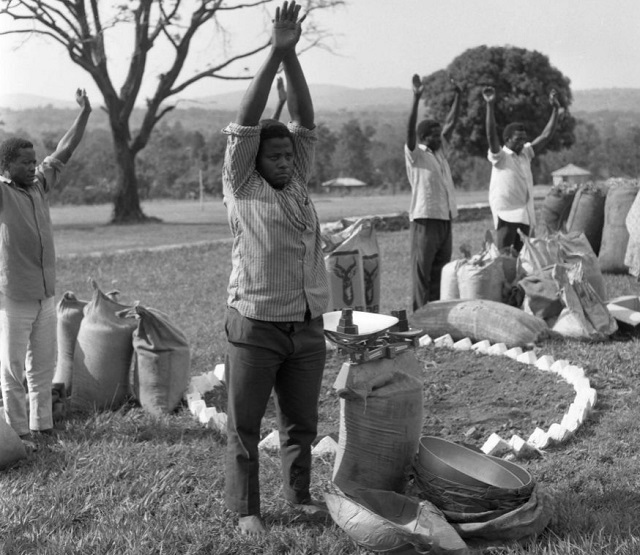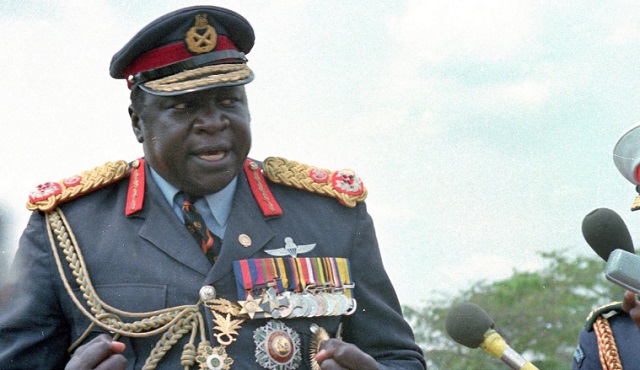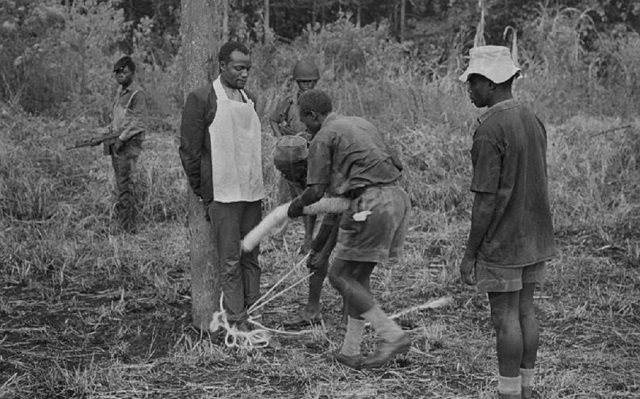
Uganda’s Africans were victimized as much as the Asians
| DEREK R. PETERSON | Fifty years ago – in early August 1972 – President Idi Amin summarily decreed the expulsion of Uganda’s “Asian” (that is, Indian and Pakistani) community. Over 50,000 people were given a scant three months to tie up their affairs and leave the country. There was a scramble to secure new homes for people rendered stateless by the Amin decree. For months, European and American media carried reports that dramatised the human misery of Uganda’s Asians.
All the attention paid to the plight of the Asian community has made it hard to see the much wider, much more violent history of Amin’s economic programme. It was Africans, not Asians, who were the targets of this larger campaign. Amin called it the “War of Economic Independence”; later it was named the “Economic War”.
Over the past decade, I’ve been working with Ugandan colleagues to organise, catalogue and digitise endangered government archives.
Uganda’s archives have, over the course of decades, been rearranged and pruned in response to changing political and intellectual demands. In the 1950s and 1960s British and Ugandan officials sought to shield the paper record from examination. This regime of access control deprived campaigners of inspiration and evidence. During the 1970s, with the ascendancy of Idi Amin’s government, archives were rendered into a national patrimony.
Civil servants hastened to ensure that the record of their accomplishments was stored in safe custody. Since the late 1980s the government of Yoweri Museveni has disinvested the state from the legacies of the past. For the Museveni government the slow decay of the public record has allowed the foreclosing of divisive debates about history.
Uganda’s political history has been episodic and interrupted, and every new regime has had to struggle anew to author a narrative about national self-becoming. That is why Uganda’s governments have taken such dramatically different positions on the management of historical knowledge. Opening or withholding archival materials is a way of editing the public record. It makes some kinds of information state secrets and renders other aspects of the past into a legacy, a source of inspiration and orientation. My work has brought the political and organisational logic of Amin’s regime into view.
The Economic War was fought by government officials who overhauled, all at once, whole sections of public life. It was a regulatory war, pursued by authorities who sought to control prices and supervise the conduct of business. It was a war in which a great many Ugandans were unwittingly made into enemies of state.
The inhumanity of the Economic War was much more widely experienced than anniversary events marking the “Asian expulsion” can acknowledge.

Economic war
It was supposed to be a war of liberation. In the speech that announced it, Amin hymned the Economic War as: “ The day of salvation for the Ugandan Africans. This is the day of the redemption of the Ugandan Africans. All Ugandans must wake up, in full and total mobilisation, determined and committed to fight this economic war until it is won”.
The Economic War made some Ugandans feel as though they were living in momentous times.
By the end of 1972, 5,655 farms, ranches and estates had been vacated by the departed Asian community. The abandoned properties fell under the custodianship of a new bureaucracy – the Departed Asians Property Custodian Board – which allocated houses and business premises to African tenants.
Here, in the conduct of business, was a theatre where black Ugandans could fight for their freedom. The “days of bargaining are done”, read a headline in the Voice of Uganda. The public expected the “new shopkeeper in their town or village to be dedicated and very hard working”, a “man of integrity and honesty” (Voice of Uganda, 9 December 1972).
New procedures were created to superintend the conduct of black-run business. Amin himself took an active interest in the matter. In the months following the expulsion of Asians, he made surprise tours of Kampala’s businesses two or three times a week. On every tour of inspection, he would give directions: he would tell a businessman to change his method of work, rearrange the stock or keep better records.
The cost of imported and manufactured goods rose dramatically in Ugandan marketplaces in the latter months of 1973. It was difficult to keep pace with the rate of price inflation, according to Derek R. Peterson, an American historian specialising in the cultural history of East Africa in his book `Government work in Idi Amin’s Uganda’ (published online by Cambridge University Press: 31 August 2021). Peterson is currently a professor of history and African studies at the University of Michigan.
According to Peterson’s narration, in October 1973 (about a year after Asians were expelled), a cup of tea purchased in Kampala – priced at 3 shillings 50 cents in 1972 – cost 10 shillings. Primus stoves that had cost 45 shillings in 1972 had doubled in price; suits of clothes that had formerly cost 700 shillings were priced at 1,300.Footnote
The Amin government responded to the inflationary pressure on prices by attempting to curate the economy. The State Trading Corporation was established by presidential decree in September 1972. It had a legal monopoly over the import and export of commodities. There were fixed prices for goods sold to consumers, and in every district there were government-appointed ‘agents’ who were responsible for the distribution and sale of commodities. These agents exercised monopoly powers.
In Fort Portal, there were eight grocers who were authorised by government to sell commodities, at controlled prices. Bundibugyo’s leading businessman, Haji Juma, was the government agent for Bata Shoes, the Voice of Uganda newspaper, fishing nets, and textiles.
Government officials preached that smuggling and illegal overcharging were moral faults, growing out of misplaced loyalties and self-serving greed.
Early in 1975, President Amin appointed an ‘Economic Crimes Tribunal’. The judges were military men, empowered to investigate and prosecute profiteers, hoarders and others who acted against the economic interests of the state. The penalty was death by firing squad, or ten years in prison.
Two days after Christmas 1976, an official in western Uganda arrested a man named Simeo Kahindo for selling goods without a licence. The man had a wide supply of articles on hand. He had six coats, twelve shirts, two blankets and eight pairs of trousers for sale. He had one bed cover and four sheets. He had three pairs of shoes on offer. He had a radio, a bicycle and two belts. He had eight tablecloths, five neckties and two hoes. He had three kilograms of sugar and five kilograms of salt. And he had 64 shillings in cash. The official who arrested Kahindo totted all of this merchandise up in two numbered columns and dispatched the lot, together with Kahindo himself, to police headquarters in Fort Portal.
In the archives of the Uganda Broadcasting Corporation, there are hundreds of photographs of Abdallah Nasur, the governor of central province. Canadian diplomats reported that he spent his time: “making surprise visits to the various business establishments, finding them in breach of various written or unwritten government regulations, closing their business, and allocating them to new owners”.
In the photos, Nasur is always at the centre of the frame, thrusting himself into the lives and businesses of Kampala’s people. In this way, petty brutality was made to look like vigour.

Economic crimes
By April 1975, traders charged with selling goods in excess of established government prices were being arrested and executed. In one case, the tribunal ordered the execution of two dozen men who were found attempting to smuggle 500 bags of coffee out of the country.
The targets of the Economic Crimes Tribunal were people without connections: petty traders, market women, people whose financial strategies ran afoul of government edicts. The most emotionally affecting pictures in the whole photographic archive are from a series made in March 1975. The photos depict people brought before the tribunal at a military barracks. The cameraman took dozens of pictures, most of them close-ups of individuals as they faced the judges.
In one photo there is a girl, her arms crossed, staring defiantly at the camera. In another photo there is a middle-aged woman, wearing a print dress, staring at the ground with tears in her eyes, her hand at her forehead. The photos were made to document the identities of the people who were being judged. What they captured, instead, is their fragility, their emotion, their nervousness, their innocence. They are evidence of the arbitrariness of justice and the cheapness of life.
Out of the hundreds of pictures taken at the Economic Crimes Tribunal, only one was ever printed or published in the government newspaper. Were the image-makers of Idi Amin’s regime squeamish about the tribunal’s draconian powers? Did they sympathise with the people whose lives were destroyed by the tribunal?
Changing regimes
In 1992, Uganda’s new ruler – Yoweri Museveni – announced that the property seized from Asian owners in 1972 was to be restored to them. Asians who wished to reclaim properties could obtain the titles from the Departed Asians Property Custodian Board; claimants were obliged to secure the eviction of Ugandan tenants themselves.
Today the board retains custody of several hundred properties. Its leadership is under parliamentary investigation: billions of Ugandan shillings have been stolen from its accounts, and its managers are accused of handing important buildings over to well-connected proprietors.
Among the many wrongs of the 1970s, among the many lives that were disrupted or ended by Amin’s regime, it is the expulsion of the Asian community that has been the focus of ongoing efforts at compensation and rectification. No one has made apology to the hundreds of innocent, terrified men and women who were pictured, in their last hour, on trial before the Economic Crimes Tribunal.
****
Derek R. Peterson is an American historian specialising in the cultural history of East Africa and professor of history and African studies at the University of Michigan
Source: The Conversation
This article has been edited for design purposes
 The Independent Uganda: You get the Truth we Pay the Price
The Independent Uganda: You get the Truth we Pay the Price





